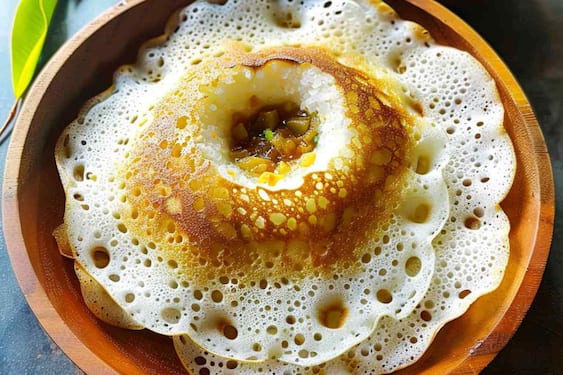Discover The Ultimate Appam Recipe For Soft And Lacy Delights
Appam is a South Indian pancake made from a fermented rice and coconut batter. The batter is poured into a hot appam pan, swirled to form thin, crispy edges with a soft center, and cooked with a lid. It's served hot with coconut milk or curry.

Appam is a traditional South Indian pancake made from a fermented batter of raw rice, cooked rice, and grated coconut. The rice is soaked, ground with coconut, and mixed with a yeast solution to ferment overnight. After fermentation, the batter becomes airy and is adjusted to a medium-thick consistency. The batter is then poured into a hot appam pan, swirled to form thin edges with a thick center, and cooked with a lid on. The result is a crispy, lacy-edged appam with a soft, fluffy center. It is typically served with coconut milk, vegetable stew, or curry.
Ingredients:
- 1 cup raw rice (preferably parboiled or idli rice)
- 1/2 cup cooked rice
- 1/2 cup grated coconut (fresh or desiccated)
- 1/2 teaspoon dry yeast
- 1 teaspoon sugar
- Salt to taste
- Water as needed
Step-By-Step Process:
1. Soak the Rice:
- Rinse the raw rice thoroughly under cold water.
- Soak the rice in enough water for at least 4-5 hours or overnight. This softens the rice, making it easier to grind.
2. Prepare the Yeast Solution:
- Warm 1/4 cup of water until it's lukewarm (not hot).
- Dissolve 1 teaspoon of sugar in the water, then add the dry yeast.
- Stir well and let it sit for 10-15 minutes until the yeast becomes frothy. This indicates that the yeast is active.
3. Grind the Batter:
- Drain the soaked rice and transfer it to a blender.
- Add the cooked rice and grated coconut.
- Gradually add water and blend until you get a smooth, slightly thick batter. The batter should be fine and free of any grainy texture.
4. Ferment the Batter:
- Pour the batter into a large bowl to allow room for fermentation.
- Add the frothy yeast mixture to the batter and mix well.
- Cover the bowl with a lid or cloth and let it ferment in a warm place for 8-12 hours or overnight. The batter will rise and become bubbly and airy.
5. Adjust the Consistency:
- After fermentation, check the batter's consistency. It should be of medium thickness, similar to pancake batter.
- If the batter is too thick, add a little water to achieve the desired consistency.
- Add salt to taste and mix well.
6. Cook the Appams:
- Heat an appam pan (a deep, rounded pan with a lid) over medium heat. Lightly grease it with oil or ghee.
- Pour a ladleful of batter into the center of the pan and swirl the pan to spread the batter evenly.
- The edges should be thin and lacy, while the center remains thicker.
- Cover the pan with a lid and cook for 2-3 minutes, or until the edges are crispy and golden and the center is cooked and soft.
- There's no need to flip the appam; it cooks perfectly with the lid on.
7. Serve:
- Gently remove the appam from the pan using a spatula.
- Serve hot with coconut milk, vegetable stew, or any curry of your choice.
Tips:
- The batter's fermentation is crucial for soft and fluffy appams. Ensure the batter is kept in a warm place to ferment properly.
- The appam pan should be hot enough before pouring the batter, but not too hot to burn the appam.
- Freshly grated coconut gives the best flavor, but desiccated coconut can be used as an alternative.
